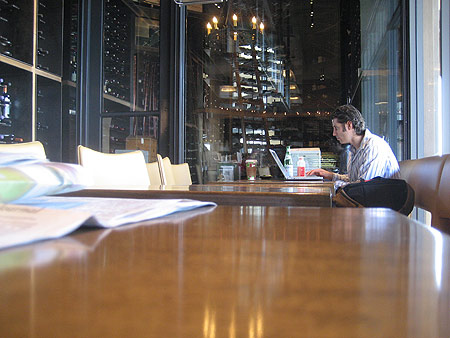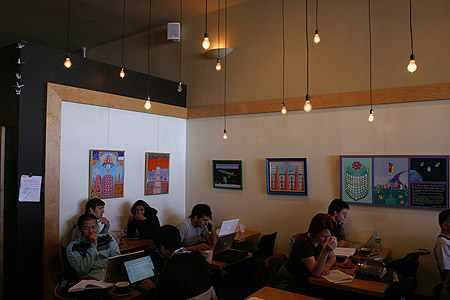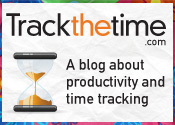Five Ways To Stay Productive In Your Mobile Office
As an independent wordsmith, Iâm well acquainted with working in non-traditional work places; for instance, my main office (home) and the other localeâs I frequent (coffee houses).
 Notice the title of this entry. Itâs not about how to be productive. Anyone can be productive, if they so desire, every now and again, sometimes on purpose, sometimes not. My objective is to show you how to stay productive once you get there.
Notice the title of this entry. Itâs not about how to be productive. Anyone can be productive, if they so desire, every now and again, sometimes on purpose, sometimes not. My objective is to show you how to stay productive once you get there.
In Rise of the Creative Class (a personal favorite), author and sociologist Richard Florida wrote, âWe are becoming a society in which Creative Class people literally live in a different kind of time from the rest of the nation.â
Who is this âCreative Classâ?
If you can identify with the following quote â from later in Floridaâs book â youâre part of it: âWhile Creative Class people do tend to work long hours, many other factors contribute to the feeling of being crunched for timeâŚThe big news about time [is that it] goes deeper than simply working moreâŚWe now try to pack every moment full of activities and experiencesâat work, at home and at leisure.â
From where I sit, (Lux Coffeebar, if you must know), these are the things that cause me to be most productive in my mobile office:

(1) Account for my surroundings
- The local coffee joint has distinct advantages and disadvantages to working out of the home. Think of the cell phone commercial with the little time clocks in the trash. Pretend those little clocks are spread out all around your home office or moving around you at the coffee house. When you talk to someone longer than you should, youâre wasting time.
(2) Anticipate Distractions
- Make decisions before you get to your home office (or wherever) about where youâre going to sit. And yes, even if youâre in the bedroom, thatâs still before you get to your desk.
- If itâs at home, think about the kinds of things that are likely to beg for your time: the laundry, that new album you wanted to check out on iTunes, updating umpteen social media outlets (Twitter, Facebook, LinkedIn, etc.) and any number of other noisy distractions. For me, even too much silence can be a distraction.
- If youâre at a coffee house, think about all the options youâll be presented with about where to sit. It doesnât matter if youâve never been to this particular place before. Sit by the door (or facing it) and youâll want to look up every time someone comes in; sit near the counter and youâll be well-placed for shouts of , âAmericano for Chris!â
- You know where the productive spots are, just like you know the best place to sit in a movie theater.

(3) Be Proactive
- The average time tracker says, âI have an hour to fill. Iâll work on project X and see how much I can get done.â
- A better time tracker says, âIn one hour, I want to have completed this, this, and that, and this. And Iâm going to spend this much time on each part. And Iâll check it off as I go and adjust the schedule in the moment. But Iâm going to do it all in one hour.â
- The difference is subtle, but significant.
- Itâs all about your motivation for tracking time at all. One person figures, âI have an hour right now. Iâll have another hour later.â The other person thinks, âI have an hour right now. I might have an hour later. I might not. I better use my time wisely while I have it on me.â
(4) Know when to say âNoâ
- To people around you.
- Say you have a significant other and he/she likes to chitchat throughout the day, but youâve got a project that needs 100% of our concentration. Let him/her know youâre going into hyper-focus mode â or opt for a nonverbal method like putting on your headphones. (When Iâm working in a public place, about a third of the time I’m wearing headphones, Iâm not actually listening to anything. Ha!)
- To Yourself.
- Thereâs a difference between changing my mind about how long it will take me to do something and changing my time range because Iâm tired of making decisions.
- Donât confuse âself-employedâ with âfreedom from commitmentsâ.
(5) Track The Time
- Itâs called âtrackingâ because youâre actively looking for clues about where The Time, somewhere out there in front of you, is headed.
- Itâs not called âfollowingâ because thatâs passive and lets time make decisions for you.
- Time Trackers discover lost time.
- They literally âfind timeâ to do more work, because the act of tracking time helps them right then; in the very moment they need it most. Ever hand write a note and then — because of the very act of doing so — you realize you could probably just throw the note away?
The first four steps have one thing in common: Theyâre all decided and acted on before hand. Only the last one takes place in the moment.
Iâd elaborate on that, but right now, my timeâs up.
(Phoenix wordsmith Joey Robert Parks is primarily a non-fiction ghostwriter. In the last six years, heâs written five books for successful, entrepreneurial types; including: a fashion designer and stylist who got his start working for JFK and Oprah; and a book on creative innovation for a high profile, multimillionaire philanthropist. To see how productive Joey is this very moment, follow him on Twitter or visit www.joeyrobertparks.com)








 Tornado Design
Tornado Design Minuteglass
Minuteglass Track The Time Blog
Track The Time Blog